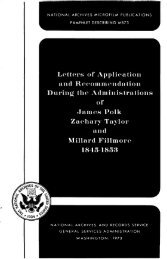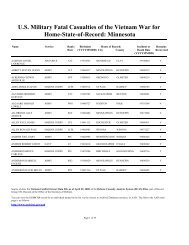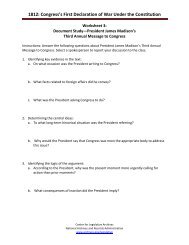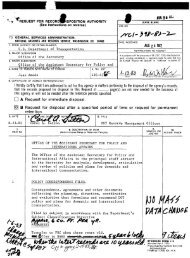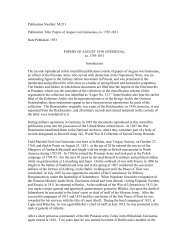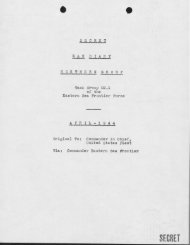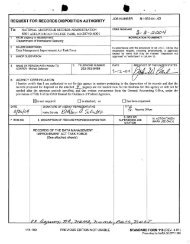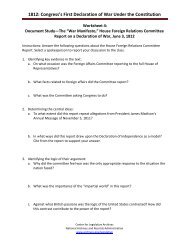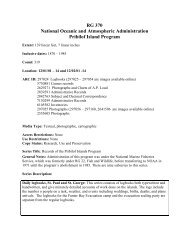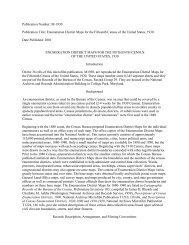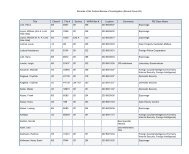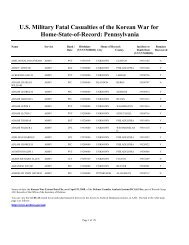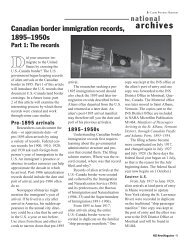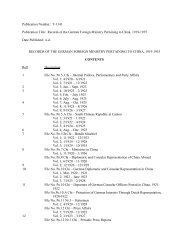HITLER'S SHADOW - National Archives and Records Administration
HITLER'S SHADOW - National Archives and Records Administration
HITLER'S SHADOW - National Archives and Records Administration
You also want an ePaper? Increase the reach of your titles
YUMPU automatically turns print PDFs into web optimized ePapers that Google loves.
In April 1945 an unnamed German defected to Switzerl<strong>and</strong> <strong>and</strong> offered up<br />
Beisner as a war criminal of Allied interest. Although Allen Dulles’s office did<br />
not trust the informant, they rated his information good. 26 According to this<br />
report, Beisner trained as an agronomist, then went into Alfred Rosenberg’s Nazi<br />
Party Foreign Policy Office (Aussenpolitisches Amt), becoming a specialist in<br />
the Balkan region. He was allegedly involved in the Iron Guard’s unsuccessful<br />
January 1941 coup in Bucharest––a Romanian “Kristallnacht” in which 120<br />
Jews were brutally murdered. The informant mistakenly placed Beisner as head<br />
of the Gestapo in Lodz <strong>and</strong> Zagreb. Beisner did, however, serve a term in the<br />
Waffen-SS, where he was assigned to the Selbstschutz, a “self-defense” force of<br />
ethnic Germans used to carry out brutal <strong>and</strong> murderous policies in Germanoccupied<br />
Polish territory. 27 Although his SS personnel file lacks evidence of it,<br />
from the spring of 1941 until late that year he served in Croatia as head of an<br />
Einsatzkomm<strong>and</strong>o Zagreb (part of Einsatzgruppe Yugoslavia). Croatian sources<br />
list him also as German police attaché to the new Independent State of Croatia. 28<br />
The Ustaschi government in Croatia admired the SS <strong>and</strong> was eager to win<br />
Himmler’s favor, according to the Croatian minister in Berlin. 29 The period<br />
Beisner was in Croatia was precisely the period when the Croatian Ustaschi<br />
engaged in massive killings of Jews <strong>and</strong> Serbs. In January 1942 Beisner received<br />
the German war cross of merit, second class, for his service, <strong>and</strong> in 1943 the<br />
Croatian government decorated him as well. 30<br />
At the end of 1941 Beisner joined SD Foreign Intelligence as a specialist in the<br />
Middle East. Assigned as an officer to Einsatzkomm<strong>and</strong>o Egypt, he went to Athens<br />
to await Rommel’s conquest of Egypt. 31 After Rommel’s defeat, he then shifted to<br />
Tunis, where he comm<strong>and</strong>ed a Security Police <strong>and</strong> SD unit <strong>and</strong> served as liaison to<br />
the Gr<strong>and</strong> Mufti. 32 He also set up an intelligence network in Tunis, which French<br />
intelligence sources reported on in some detail. When German forces had to<br />
evacuate Tunisia, Beisner went to Italy, <strong>and</strong> he tried to keep his Tunisian network<br />
running. In fact, he sought intelligence covering the Near East generally. 33<br />
He spent the last part of the war in Italy, where American forces apparently<br />
captured him. Gehlen Organization sources later said Beisner escaped from American<br />
internment with French help <strong>and</strong> then went to work for French intelligence in<br />
Austria. 34 In late 1950 an Austrian official who located Beisner in Munich asked the<br />
CIA for information about him. A CIA official thought Austrian interest stemmed<br />
Nazis <strong>and</strong> the Middle East | 25



